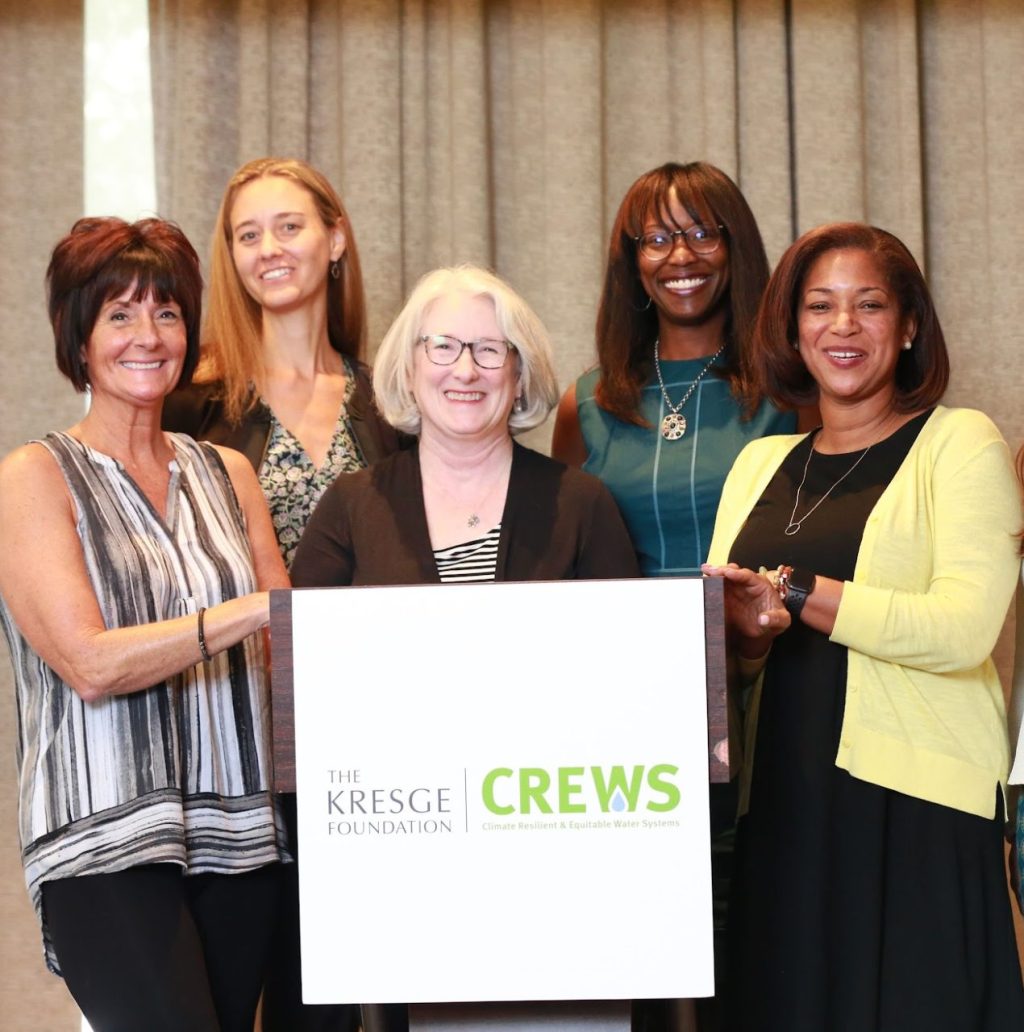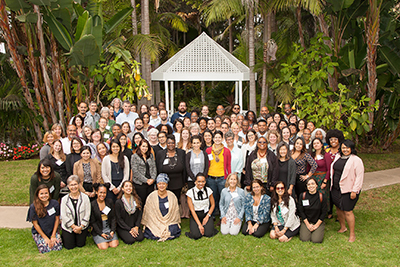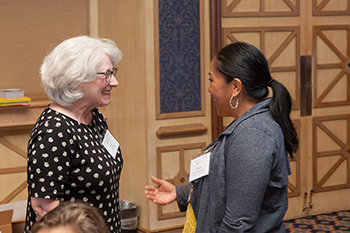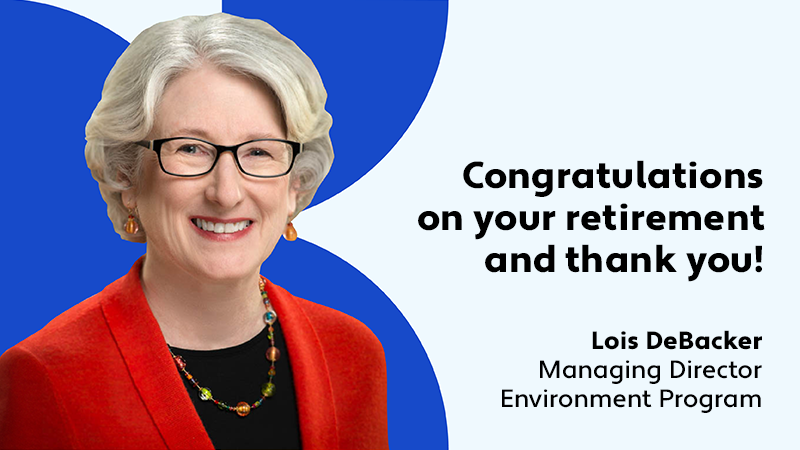40+ years of advocating for environmental protection
DeBacker can trace her passion for sustainability issues back to 1973 as a “card-carrying environmentalist” and the co-organizer of a daylong environmental teach-in at her high school.
“I came to appreciate as a teenager how critical public policy was to environmental protection,” DeBacker said. That realization led to my decision to major in political science in college and ultimately pursue a career in environmental policy, followed by environmental philanthropy.”

DeBacker received her bachelor of arts degree from the University of Michigan and a master’s degree in public affairs from the Princeton School of Public and International Affairs. Her graduate work focused on urban and domestic policy.
Early in her career, DeBacker worked in Michigan state government in policy development and program management capacities. Before joining Kresge, she spent more than 16 years at the C. S. Mott Foundation in a series of positions of progressive responsibility, including the role of Associate Vice President of Programs.
“When we contemplated building out an environmental program at the Kresge Foundation some 17 years ago, one name immediately moved to the top of my list: Lois. I had long admired Lois’ work at the Mott Foundation,” said Rip Rapson, Kresge’s president and CEO. “Not only did she enjoy a reputation within philanthropy for her thoughtful, thorough, and deeply passionate work on behalf of the environment, she was seen as the consummate philanthropic colleague: generous with her time, supportive of others, and utterly without ego. As rewarding as her work with Mott had been, we were blessed by good timing. Lois was ready to be closer to family and was intrigued at being asked to create what would, in effect, be an environmental start-up. Asking her to join Kresge was one of the best decisions I’ve made in my time at the foundation. She has built one of the most effective, ambitious, and impactful environmental philanthropies in the country. We are deeply in her debt and will miss her deeply.”
From conservation grants to adopting a climate change strategy focused on mitigation, adaptation and equity
Prior to DeBacker’s tenure, Kresge’s environmental grantmaking largely focused on capital challenge grants and a companion program, the Green Building Initiative, which supported the adoption of sustainable building practices by nonprofit organizations.

Under DeBacker’s leadership, the Environment Program came to focus on urban climate action, consistent with Kresge’s commitment to expand equity and opportunity in America’s cities. The foundation also advanced the notion that achieving climate resilience requires that communities aggressively reduce greenhouse gas emissions, prepare for climate impacts, and build social cohesion – as all three elements are necessary for communities to be as safe and vital as possible in the face of climate change.
“In 2014, the foundation began to explicitly address the inequitable impacts of climate change on low-wealth communities and communities of color,” DeBacker said. “We began to prioritize ensuring organizations that authentically represent the needs, interests, and knowledge of such communities have access to and influence in decision-making venues related to climate change.”
“Lois has made unparalleled contributions to the field of environmental grantmaking,” said Benjamin Kennedy, vice president of programs at Kresge. “Her decades-long commitment to our planet and the fight against climate change are a gift and a service to us all. That said, so many of us who were lucky enough to work with Lois know her principally as a deeply kind, caring, thoughtful and generous colleague and friend. Therein lies the essence of Lois’ leadership. She brings unwavering strategic focus combined with gracious humanity to every room she is in. We celebrate Lois…and we will miss her immensely.”
Equity-focused initiatives set the tone for grantmaking to advance justice
DeBacker led the design of Kresge’s Climate Resilience and Urban Opportunity (CRUO) initiative, a five-year, $29 million effort launched in 2014 that supported the capacity of advocates and organizers in urban communities to advance climate-resilience work of importance to them.

The initiative’s design was strongly influenced by input from environmental justice leaders across the country, including individuals who participated in the Kresge-sponsored Pathways to Resilience dialogues led by the Movement Strategy Center.
“Lois took a leap of faith when we launched CRUO. She was committed to bridging between on-the-ground racial justice and climate groups in new ways, and she held space for emergent design in a large-scale national initiative in an unprecedented manner,” said Marian Urquilla, principal of Strategy Lift, a national consulting practice focused on coaching, strategy development and large-scale community change. “Lois opened up the national initiative to sector and movement leaders, listening deeply and sharing decision-making in a gracious and steadfast manner. It has been one of the joys of my career to work with her because she brings an extraordinary mix of creativity, humility, and savvy. Her leadership changes what’s possible.”
Urquilla coached DeBacker with the design of the CRUO initiative, worked closely with the team during its implementation, and consulted with the team in other strategy refinement efforts.
DeBacker was also a strong proponent of establishing Kresge’s Climate Change, Health & Equity (CCHE) initiative, launched in 2019 to mobilize equitable climate mitigation and adaptation action by healthcare institutions, health practitioners and community advocates. This initiative is managed jointly by the Environment and Health teams.
“Lois was that exceptional partner who was willing to put aside boundaries, turf, and even ego in pursuit of exploring the emerging frontier between health and the environment, between climate change and health equity,” said David Fukuzawa, former managing director of Kresge’s Health Program who served at the foundation for 20 years before retiring in 2020. “CCHE became possible because she was willing to invest in pioneering efforts to define the intersection between climate change, health and racial equity. Before CCHE, it was hard to find any environmental grantmakers who supported work in this intersection.”

During DeBacker’s tenure, the foundation has also managed strong and strategic grantmaking aimed at energy efficiency, building decarbonization, and resilient power, with the dual goals of reducing greenhouse gas emissions and ensuring that low-wealth communities and communities of color benefit from the nation’s transition to clean energy sources.
That work has grown to include a strong partnership between Kresge’s Environment team and Social Investment Practice to build a pipeline of clean energy projects in low-wealth communities and communities of color that will be positioned to compete for federal Greenhouse Gas Reduction Fund dollars.
While Kresge is known for being an early funder of climate adaptation in the U.S. and is proud of that work, DeBacker has always emphasized the importance of funding climate mitigation as well.
“We know that every tenth of a degree by which climate change can be limited matters for the wellbeing of all life on Earth, now and into the future. Rapidly reducing greenhouse gas emissions is an urgent priority,” DeBacker said.
A description of the entire set of giving priorities can be found on the Environment Program website page.



